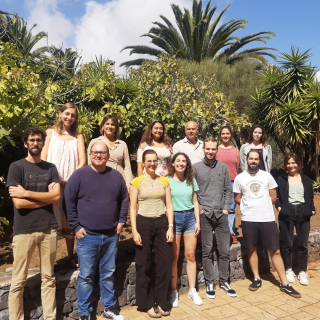Bibcode
Chonis, Taylor S.; Martínez-Delgado, David; Gabany, R. Jay; Majewski, Steven R.; Hill, Gary J.; Gralak, Ray; Trujillo, I.
Referencia bibliográfica
The Astronomical Journal, Volume 142, Issue 5, article id. 166 (2011).
Fecha de publicación:
11
2011
Número de citas
30
Número de citas referidas
28
Descripción
We present deep surface photometry of a very faint, giant arc-loop
feature in the halo of the nearby spiral galaxy NGC 5055 (M63) that is
consistent with being a part of a stellar stream resulting from the
disruption of a dwarf satellite galaxy. This faint feature was first
detected in early photographic studies by van der Kruit; more recently,
in the study of Martínez-Delgado and as presented in this work,
from the loop has been realized to be the result of a recent minor
merger through evidence obtained by wide-field, deep images taken with a
telescope of only 0.16 m aperture. The stellar stream is clearly
confirmed in additional deep images taken with the 0.5 m telescope of
the BlackBird Remote Observatory and the 0.8 m telescope of the McDonald
Observatory. This low surface brightness (μ R ≈ 26 mag
arcsec-2) arc-like structure around the disk of the
galaxy extends 14farcm0 (~29 kpc projected) from its center, with a
projected width of 1farcm6 (~3.3 kpc). The stream's morphology is
consistent with that of the visible part of a giant, "great-circle" type
stellar stream originating from the recent accretion of a
~108 M sun dwarf satellite in the last few Gyr.
The progenitor satellite's current position and final fate are not
conclusive from our data. The color of the stream's stars is consistent
with dwarfs in the Local Group and is similar to the outer faint regions
of M63's disk and stellar halo. From our photometric study, we detect
other low surface brightness "plumes;" some of these may be extended
spiral features related to the galaxy's complex spiral structure, and
others may be tidal debris associated with the disruption of the
galaxy's outer stellar disk as a result of the accretion event. We are
able to differentiate between features related to the tidal stream and
faint, blue extended features in the outskirts of the galaxy's disk
previously detected by the Galaxy Evolution Explorer satellite. With its
highly warped H I gaseous disk (~20°), M63 represents one of the
several examples of an isolated spiral galaxy with a warped disk showing
recently discovered strong evidence of an ongoing minor merger.
This paper includes data taken at The McDonald Observatory of The
University of Texas at Austin.
Proyectos relacionados

Huellas de la Formación de las Galaxias: Poblaciones estelares, Dinámica y Morfología
Bienvenida a la página web del g rupo de investigación Traces of Galaxy Formation. Somos un grupo de investigación amplio, diverso y muy activo cuyo objetivo principal es entender la formación de galaxias en el Universo de una manera lo más completa posible. Con el estudio detellado de las poblaciones estelares como bandera, estamos constantemente
Anna
Ferré Mateu